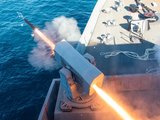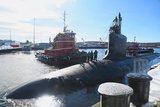Leonardo to provide APS for USCG cutters
Leonardo DRS has received a contract worth $10.7 million from Eastern Shipbuilding to provide integrated hybrid electric drive systems for the US Coast Guard's (USCG's) new fleet of Offshore Patrol Cutters, the company announced on 13 April.
The contract covers the delivery of the first nine systems.
Leonardo DRS will provide its permanent magnet motor-based Auxiliary Propulsion System (APS). This hybrid electric drive system provides capability for the ship to operate efficiently at slower speeds, increases mission duration capability, reduces emissions and provides emergency take-home capability, in case of a failure of the main propulsion diesel engines. When coupled to the main propulsion gearbox, the system allows the ship to operate quietly during loitering operations while providing superior fuel economy for increased on-station operations and capability.
Built and designed by Leonardo DRS, the APS includes two permanent magnet motors. They have significant advantages with regards to size, weight, efficiency and performance over conventional electric induction motors and create more torque from the same amount of supplied current. Their smaller footprint enables maximum flexibility in engine room design and increased cargo space.
Using propulsion diesel engines at slow speeds causes wear and tear on the engines and increases the potential for coking/wet stacking. The electric APS will help the USCG reduce fuel and maintenance requirements.
More from Naval Warfare
-
![US Navy to develop an undersea networking capability to support UUV operations]()
US Navy to develop an undersea networking capability to support UUV operations
The NEREUS project aims to enhance and expand the US Navy’s existing communications systems, enabling crewed/uncrewed seabed and subsurface missions.
-
![How the Hedge Strategy will impact the US Navy’s future capabilities]()
How the Hedge Strategy will impact the US Navy’s future capabilities
The US Navy Hedge Strategy is intended to provide a lethal, modular and cost-effective fleet while accepting Washington’s fiscal and industrial constraints.
-
![US Navy and Raytheon explore additional applications for Mk 58 CRAW torpedo]()
US Navy and Raytheon explore additional applications for Mk 58 CRAW torpedo
Designed as an anti-torpedo and anti-submarine capability, the USN and RTX foresee the Compact Rapid Attack Weapon’s potential for deployment from surface ships and aerial and uncrewed platforms.
-
![European navies line up $105.8 billion in unawarded contracts for 2026]()
European navies line up $105.8 billion in unawarded contracts for 2026
France, Germany and Italy lead the way on unawarded naval defence opportunities that could be awarded this year, but across Europe countries are ramping up their spending efforts to face geopolitical challenges.























